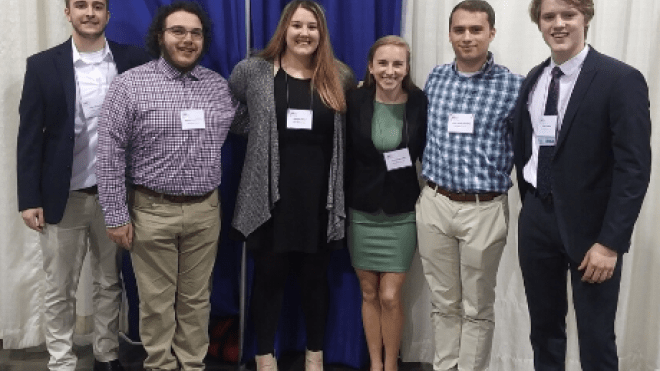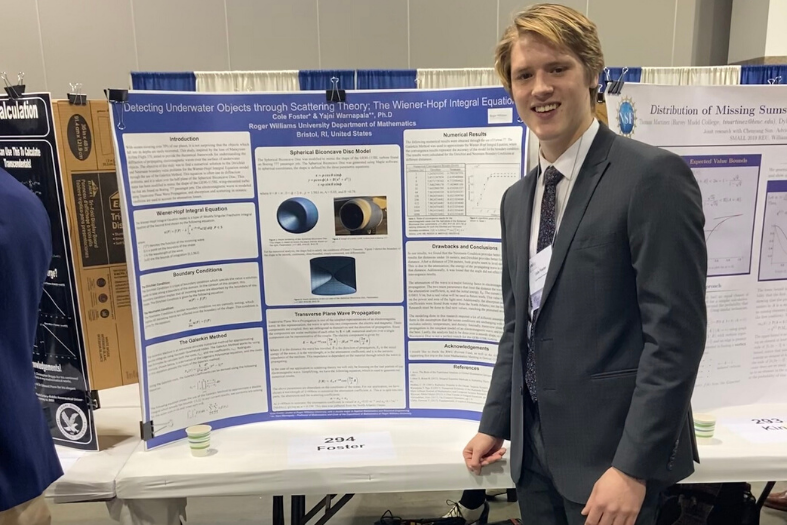Applied Math Majors Win Awards for Innovative Research
Senior applied math majors Abigail Small and Cole Foster won Most Outstanding Poster awards at the Joint Mathematics Meeting In Denver, Colorado this January

What ever happened to the Malaysian Airlines Flight 370 that disappeared in 2014? Is neurostimulation an effective treatment for Post-Traumatic Stress Disorder (PTSD)?
These are questions that you may not associate with math, but the work of senior applied math majors Abigail Small and Cole Foster is a far cry from writing equations on a chalkboard.
Foster and Small presented their innovative research to a group of prestigious mathematicians at the largest mathematics meeting in the world, the Joint Mathematics Meeting, held in Denver, Colorado this January. Their groundbreaking work and stellar presentations won them each the Most Outstanding Poster award in their respective areas of expertise.
“They’re judged on how the poster looks, how innovative the problem is, and how they defended their research and answered the questions,” said Yajni Warnapala, professor of mathematics and chair of the department. “Winning was a huge honor for the applied math program.”
Foster’s research uses the computer to look at the interaction between light waves and the surface of an underwater object, such as the Malaysian Arline Flight 360.
“We are trying to give some theoretical framework to help find and detect underwater objects such as that plane,” said Foster, who also majors in engineering (electrical). “We’re taking electromagnetic (light) waves and sending them through the water. The wave will have some losses from scattering and selection. We’re trying to model the diffraction, where the light hits the object and bounces off. We’re looking at the interaction at the surface of the shape.”

This is Foster's second consecutive win. He also took top honors in the same category – Numerical Analysis – at last year's meeting in Baltimore, and says these experiences help prepare him for a future in his field.
“The feedback is awesome,” Foster said, who won in the Numerical Analysis category. “You get three judges filling out a form, telling you what they liked and things to include or explain better. That’s helpful as I go to write my thesis this semester.”
Though his research is through the math department, double majoring offers an incredible opportunity to explore a specific field of interest that relies on a mathematical foundation. Whether it be engineering or another field like finance or biology, applied math pairs well with many majors.
Graduate Research as an Undergrad
Small, who won Outstanding Poster in Bioinformatics, is also majoring in computer science. She began her research the summer between her freshman and sophomore years, when she got a Rhode Island Summer Undergraduate Research Fellowship (SURF), to investigate treatments of neurological disorders, under the guidance of Assistant Professor of Mathematics Edward Dougherty.
“My poster was on using mathematical modeling to investigate treatment for Post-Traumatic Stress Disorder,” Small said. “They place electrodes on the brain in different places and a current travels from the source through the brain, stimulating the area that governs the symptoms. It’s not completely known why it works. It’s just known that it does work for combatting the symptoms of the disorder.”

Small is going to graduate school next year and the opportunity to travel and present at professional conferences has given her a significant leg-up in the application process.
“We do graduate level research at the undergrad level and that’s a huge plus for industry and graduate pursuits,” Small said. “It’s a huge highlight on a resume. I’ve been to about 14-15 conferences in the past three years and I have two publications, which is kind of unheard of, but it’s all because of the opportunities that MNS and the applied math program have given me.”
The opportunity for this level of research and exposure sets the applied math program at RWU apart.
“Here, you can’t do the major without research,” Warnapala said. “These are not semester projects, but multi-year projects. They get to do highly innovative, creative research that in most programs only PhD students get to do and they get individual attention from faculty that you would never get in a big school.”